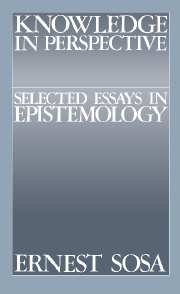Book contents
- Frontmatter
- Contents
- Sources and acknowledgments
- Introduction: back to basics
- PART I WHAT IS KNOWLEDGE, AND HOW IS IT POSSIBLE?
- PART II THEORIES OF JUSTIFICATION
- PART III INTELLECTUAL VIRTUE AND EPISTEMIC PERSPECTIVE: A VIEW PRESENTED
- 9 The foundations of foundationalism
- 10 The raft and the pyramid: coherence versus foundations in the theory of knowledge
- 11 The coherence of virtue and the virtue of coherence
- 12 Testimony and coherence
- PART IV INTELLECTUAL VIRTUE IN PERSPECTIVE: THE VIEW DEVELOPED
- Index
9 - The foundations of foundationalism
Published online by Cambridge University Press: 08 January 2010
- Frontmatter
- Contents
- Sources and acknowledgments
- Introduction: back to basics
- PART I WHAT IS KNOWLEDGE, AND HOW IS IT POSSIBLE?
- PART II THEORIES OF JUSTIFICATION
- PART III INTELLECTUAL VIRTUE AND EPISTEMIC PERSPECTIVE: A VIEW PRESENTED
- 9 The foundations of foundationalism
- 10 The raft and the pyramid: coherence versus foundations in the theory of knowledge
- 11 The coherence of virtue and the virtue of coherence
- 12 Testimony and coherence
- PART IV INTELLECTUAL VIRTUE IN PERSPECTIVE: THE VIEW DEVELOPED
- Index
Summary
There is a controversy in contemporary philosophy over the question whether or not knowledge must have a foundation. On one side are the foundationalists, who do accept the metaphor and find the foundation in sensory experience or the like. The coherentists, on the other side, reject the foundations metaphor and consider our body of knowledge a coherent whole floating free of any foundations. This controversy grew rapidly with the rise of idealism many years ago, and it is prominent today not only in epistemology proper but also in philosophy of science and even in ethics.
The discussion of this issue has been lamentably hampered by confusion and misunderstanding, and in this neither side is wholly innocent. The reflections that follow are not meant to settle the controversy, but only to help us understand it more clearly.
Foundationalism is often defended as the only acceptable alternative to an infinite regress of justification. It is now in fashion to reply that an infinite regress is not objectionable so long as we do not require that all members of the regress be actually held, actually justified beliefs, but only that each member be justifiable by reference to its successor. Actual justification will proceed only so far as the occasion demands, but it could always proceed further, if further doubts were pressed (as we are told by Wittgenstein, e.g., early in the Blue Book).
- Type
- Chapter
- Information
- Knowledge in PerspectiveSelected Essays in Epistemology, pp. 149 - 164Publisher: Cambridge University PressPrint publication year: 1991
- 1
- Cited by



